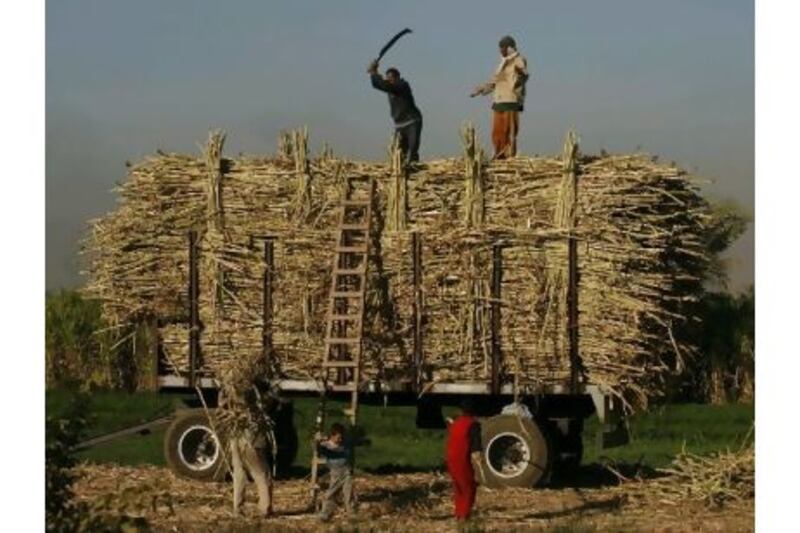MINIYAT AL HAYT, // In this verdant farming community south of Cairo, village elder Hamdy Moustapha has something to say about the country's changing government. But his voice is not quite loud enough. There are simply too many noisy children around him.
Even for Egypt, where youth under 18 make up almost 40 per cent of the population, the effect is striking: groups of children are everywhere, harvesting vegetables from the fields, darting through the workshops that spill out into the unpaved streets, and spreading breadcrumbs atop the roofs of each house for the flocks of ducks and chickens many families keep as a substitute for buying costly meat.
In 10 years they have doubled the population of this town of 45,000 in Fayoum, a farming district 100km south of Cairo that has drawn on the waters of the Nile since Pharaonic times to grow wheat, fruits and vegetables.
The population explosion has overwhelmed the school system and health services, led farmers to illegally build and rent out houses on scarce farmland, and left adults worried about the village's economic future at a time when political change is roiling Egypt.
Miniyat el Hayt is hardly a unique case: all across Egypt, rural communities with 57 per cent of the country's population are confronting massive economic and infrastructure challenges as their children approach working age. And the population keeps growing.
These farming communities, which for decades have depended on the government to guarantee the economic viability of their productive fields by providing free water and other subsidies, are looking to Egypt's new leaders to overcome these challenges.
Mr Moustapha has worked for a government office for 25 years but still earns just 450 Egyptian pounds (Dh282) per month.
He said he has trouble imagining an economic future for his five children at a time when government offices are not hiring, many state-owned factories in the area have closed down, and when the price of a hectare of local farmland has climbed to well over US$100,000 (Dh367,000).
He explained that he hopes that the recent ousting of Hosni Mubarak, the former president, will change everything.
"The two things, freedom and standard of living, are equally important," he says amid a large group of children and nodding adults.
"We haven't seen any big changes - the revolution is still early - but we are waiting desperately for them."
Among the villagers in the group, only one had the means to attend recent protests in Cairo that brought down Mr Mubarak's government.
But all said they are following events as closely as anyone in Egypt, in the knowledge that the success or failure of the village's lifeblood, its farms, is intricately tied to the decisions a new government takes.
In the village "first things come from God, then they come from the government", says Hussain Goma, an electrical technician who farms two feddans, just under a hectare, of wheat fields.
"The farms are an essential part of Egyptian society," he says. "Right now there's just not enough support from the government with the high price of fertilisers and bank loans."
Egypt's government builds canals and water pipes for the country's farms, and subsidises fertilisers and energy. It also sets prices for wheat, corn, rice, sugar cane and cotton that are often higher than international market rates, and has spent billions of dollars to transform huge areas of the desert into farmland.
But in the context of a history of agricultural policy that dates back to ancient times, when the Pharaoh's officials regulated the spread of the flood waters of the Nile, the government of today plays a much reduced role in the country's farms, experts say.
Under Mr Mubarak, the Egyptian government rescinded many socialist-inspired agricultural policies and sought to improve the country's crop yields and efficiencies by encouraging the growth of large, privately owned farms which use sophisticated modern agricultural technology.
Government officials scrapped tenancy agreements that had put most of the land in the hands of small farmers, ended many price controls and created incentives for private investors to pour money into agriculture.
The reforms successfully raised the country's total agricultural output and cut waste, according to official statistics.
But the changers proved to be highly unpopular among small farmers, because they reduced the farmers' incomes and appeared to favour big landowners and well-connected companies.
Mr Mubarak's reforms closed off the possibility that new farmers would ever have the chance to buy up new farmland around Miniyat al Hayt, says Mohammed Lotif Sharif, a former police watchman who retired seven years ago and said he witnessed numerous instances of petty corruption.
"The new lands reclaimed from the desert, they divided it among themselves, to their sons and their friends," says Mr Sharif, who has five children and said he wants them to have the same opportunity as others to buy farmland.
Residents said they are happy that they have not seen any sign of the police since they withdrew from the village - along with the rest of Egypt's cities and towns - on the night of January 28.
But the village clearly cannot last long without the government's support.
"The freedom is wonderful, finally there aren't any barriers to express our views," says Gabr Ashour, a 50-year-old farmer.
But the government, he adds, "must help the farmer".





